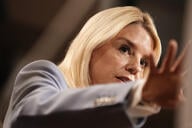You have /5 articles left.
Sign up for a free account or log in.

fotostorm/e+/getty images
The COVID-19 pandemic has undoubtedly affected every aspect of our lives, including our professional trajectories. The pandemic also provides opportunities to reimagine the future of work. While the virtual world has expanded our view of professional development, the pandemic also exacerbated already existing issues for training and career advancement in research and policy.
My personal interest is to advocate for early-career scientists and empower them to use their knowledge and expertise to make a positive impact in society. Once they get a flavor for how this impact may be achieved, many pursue nonacademic routes as a long-term career goal.
Science policy is one of the routes that allows for translating research expertise into societal impact. From my own personal career transition, as well as through virtual sessions where I’ve advised and mentored early-career scientists interested in science policy careers, I’ve learned a few things that I want to share more broadly in this essay.
Many early-career scientists ask about my own career path, and I’m happy to discuss it, but I always ask what their goals are and try to provide tailored advice. I think sometimes when providing career advice to early-career scientists, we may forget to look at particular issues from their perspective as opposed to our own.
Seek Out Mentors
That said, advice from those with experience in science policy can be helpful for painting an accurate picture of potential career directions. If I had to sum up my own career path, I’d say this one thing: be bold. As I’ve learned from Kenneth Gibbs at the National Institute of General Medical Sciences and many others who have been informal science policy mentors along the way, you should “never self-eliminate.” If you don’t try, the answer will always be no. What’s stopping you from reaching your potential?
Science policy is a fairly competitive field, in which many early-career scientists engage in similar experiences. Those might include writing for nonscientific audiences, volunteering on science policy projects with different organizations or starting/getting involved with local science policy groups. These roles may be helpful to advance their skills in communicating with nonscientific audiences and networking for science policy careers and opportunities. In order to stand out when looking for your next step, I would advise seeking distinct opportunities that enable you to showcase your talents and get a little ahead of the game.
Getting involved with organizations working on science policy topics that you are particularly passionate about is a good way to start -- and you can build your expertise and brand around that. I recently participated in a National Science Foundation-sponsored workshop, “The Future Substance of STEM Education,” led by Arizona State University. Given my interest in this topic, I applied for and got accepted into this workshop series, which has enriched my knowledge on this topic, allowed me to work in an interdisciplinary team and broadened my network with individuals in this space. As part of the workshop, our group designed a certificate program aimed at training participants on how to solve key current and future societal problems using science and innovation.
To speak from my own experience, I would say that I landed where I am today professionally due to my own tenacity and relentless drive toward a cause. I’ve always been driven, but I didn’t quite fathom how much I could do until I decided to focus all my efforts toward one goal: developing the STEM workforce and enabling early-career scientists to engage in the policy-making process to impact issues they care about. I will admit that it’s been a bit of building the plane while in the air, which is an aspect that I enjoy in terms of being entrepreneurial. I’m grateful for folks who believed in me along the way -- and I hope this is just the beginning -- and continue to push me into directions that challenge me. This is where having mentors in nonacademic fields that you want to go into is helpful for exploring ideas and potential career directions. For example, I give particular thanks to Shalin Jyotishi, senior analyst at New America and CEO at the Journal of Science Policy and Governance, who has been a great colleague and mentor in both science policy and entrepreneurship.
Say Yes to Opportunities
Throughout my career, I have also said yes to opportunities that I didn’t think I was quite ready for, but that I would hopefully grow into. One was taking on the role of associate director of fundraising and strategic initiatives for the nonprofit Future of Research in 2018. I had no prior fundraising experience but did it purely because I believed in the mission of the organization and wanted to contribute significantly to advancing it. In this role, I was able to develop a comprehensive fundraising strategy, as well as gain knowledge about existing funding opportunities on issues related to higher education that I’m passionate about. This role was beneficial in many more ways than I could have imagined, and I still use a lot of that knowledge today.
With this example in mind, I like the saying that “if something scares you, that’s probably good for you,” in the sense of accepting new roles that will challenge you. You may not be confident in your abilities to perform well in those roles at the start, but most often they aren’t things that you should say no to, as they may only come along once in your professional career.
Accepting challenges that you aren’t ready for but you can learn to tackle along the way is one of the best ways to continue learning and growing professionally. To an extent, the more you say yes to things, the more opportunities will result from those roles. And provided you do a good job, it will be a perpetual cascade of experiences that can take your career in unexpected directions.
Think Strategically
Even if you aren’t ready for an opportunity, if it’s in front of you, say yes anyway. My other piece of advice would be to take strategic risks and say yes to opportunities that will particularly help you grow in new ways than your current roles do.
Often, in your career exploration into science policy or other similar spaces, you just have to start somewhere and explore options, which will help you discover your interests. But you should also think strategically about what each opportunity will provide and what door it might open, and likewise say no to options that may not lead anywhere. In my journey from the bench to science policy, each opportunity I engaged in allowed me to develop different types of skills. In the first, I did a lot of blogging, in the second, I organized workshops, in the third, I published papers on higher education topics and in the fourth, I advised and helped trainees navigate their own professional career paths in science policy. These have all been really useful skills to learn for advancing science policy and staying connected to the academic community.
Over all, building a career path while thinking outside the box can be rewarding, especially if you enjoy being entrepreneurial. It will take courage and taking a leap of faith into the unknown, but being bold and exploring options that you hadn’t considered will get you far and may even change your professional path.
To close with a pandemic angle, take advantage of virtual opportunities to learn and grow, reach out to professionals whose career paths you admire but may be reluctant to approach in person, apply for jobs that seem a bit out of your reach but you might see yourself in, or take a class to learn a new skill that you may need down the road.
Think about ways you can take your career to the next level by expanding your knowledge and opportunities from home, and remember to be bold in your professional endeavors.




